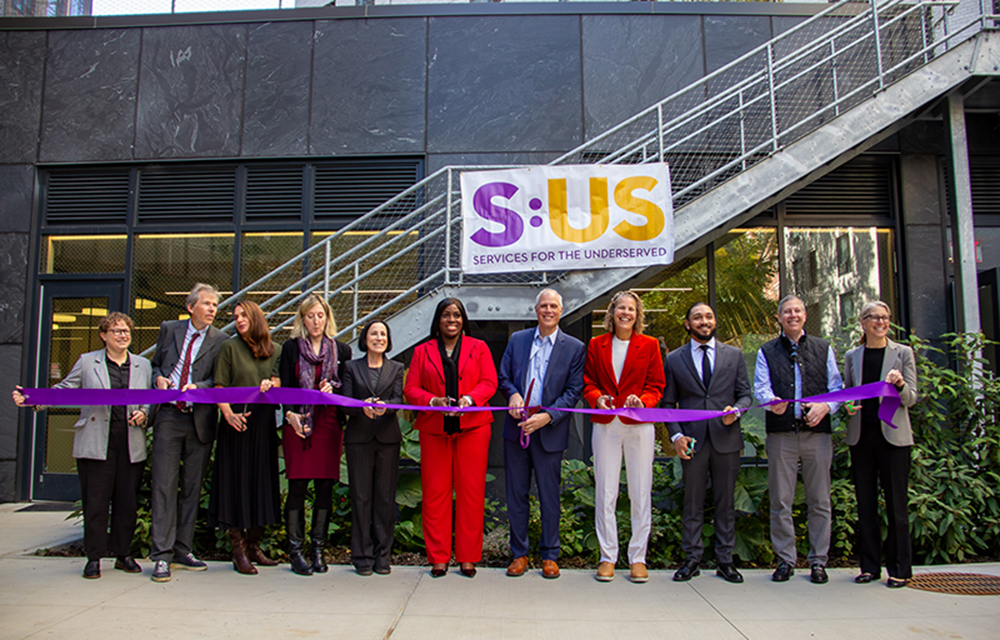News:
Construction Design & Engineering
Posted: October 16, 2012
Executive of the Month: Frank Fortino, president/CEO of Metropolis Group: Helping his clients achieve their development goals
In 1988, Frank Fortino saw an opportunity to work with an architectural firm named Emory Roth & Sons. They were a well known architectural firm that designed and built along with construction companies such as George Fuller, Mose Diesel, Lehr, McGovern, and Tishman Construction, etc. Fortino joined the firm while attending NYIT in 1980, where he was working towards receiving his bachelor of arts in Architecture. At the age of 20, he worked with owners and builders while working his way up to an associate position at the age of 24.
Fortino worked as a code and zoning consultant on behalf of Emory Roth & Sons. He was an in-house consultant and worked along side his project managers. His experience within the well-rounded Emory Roth & Sons firm allowed him to grow within the industry. At the age of 29, he started his own company, which we know today as Metropolis Group, Inc. He current serves as the company's president/CEO. He saw an opportunity to work closely with owners where he would not only assist them with code issues, but he would also help in the development of a site. For example, he would help with the renovations that would occur with the owners on existing buildings as well. Fortino was able to work diligently and get to a solution for every project he worked on.
He hired his employees based on reputation, honesty, and hard work. He was and still is a believer in working hard and being part of a good, yet solid, organization can help grow company services to the client. The city agencies that his office is involved in are consulting with the Department of Buildings, Landmarks and Department of Transportation. He has seen how difficult dealing with the different agencies can be, given his experience and understanding of the process and codes. He has created a business with a personal touch. Every day he meets with his staff before they go off to the agencies. Their meetings involve thorough discussions on projects going on at the given time and future projects to come. They mainly do this to ensure they discuss any issues or concerns at hand, and to make sure that Metropolis as a company, works towards addressing all necessities for that day. Constant communication between their employees and clients are key. The reason is simple, there are many moving parts to a project, and if open communication is not there, then the project will suffer.
Fortino's key role is to meet with owners and developers to provide a strategy on how to best go about each individual project. Each project needs it's own key ingredients in order to make sure it's a success. They are here to help clients understand the process and most of all to see that all of the issues and problems of the projects are addressed as quickly and smoothly as possible. Metropolis files the projects for the city to review. No one in this company can assume that an examiner will receive the project in a timely manner, and no one can see the future or what types of objections will be raised. What they can do, given their experience, is to provide a complete package; which provides the examiner proper information so that they can render the examination, possibly minimize the objections, and obtain the approval in the most efficient way possible.
Another key point is that Fortino has the ability to see zoning and building code issues prior to them occurring. N.Y.C. is a very unique place to build. The laws are such that they are difficult to design, whether it's a space or a building. His experience is that these challenges are always dealt with during preliminary stages of a project. Fortino and his team review the project to find solutions to these issues. Whether it's the tweaking of the design or finding a solution to a more technical issue; Fortino and his staff discuss these issues, and then file with the executive office for pre-reconsideration. The executive office always finds that the requests are in line with the intent of the code, and usually receives a favorable response.
Fortino and his office have created teams of individuals who have a good handle on what needs to be done on a day-to-day basis. The teams are arranged to have a project manager, project coordinator, and project expediter. They have arranged these teams to make sure that they work well together, and to have a good rapport with one another. They find that the team structure implemented within our company utilizes the strengths of our staff resulting in successful projects, always keeping the client happy.
The way they track our projects is by creating a detailed matrix at the beginning of each project. The matrix expands with information throughout the life of the project until it receives a letter of completion or amended Certificate of Occupancy. Part of the matrix shows all the different files submitted, the status of each filing, the progress, and the requirements needed to get an approval. The matrix will also show all of the outstanding violations, what type they are, and how the violations need to be dealt with. In today's new policies and procedures, the Department of Buildings also requires the owners to complete the files, which are done at the buildings. Their matrix will have this information recorded during the construction phase. The building's owner and the consultant will know and understand what it takes to obtain a clean building, which has no violations and has all applications, signoffs, and an updated Certificate of Occupancy.
Metropolis plays a key role in coordinating with the construction company and the sub-contractors. Metropolis always starts off the Certificate of Occupancy process with the owner or owner's representative and the contractor. What they need to do is have the project matrix updated to show all the outstanding open applications; which need to be completed and closed. They list all the outstanding violations and report back on how to resolve the violations as part of the matrix. They list details of what is required for the sprinkler, construction, plumbing, and fire alarm. As part of the list, they show roughly, what inspections have been done and what is required in order to obtain final signoff. As part of their service, Metropolis always walks through the building or space to see how the construction phase is going. They point out all the defects that the construction may have. They coordinate this effect with the contractor and establish a schedule as to when they would be finished with construction. They do this so that we can arrange and be prepared for the Department of Buildings inspections and the construction signoff. The construction division and the Certificate of Occupancy division need to make sure that they provide other signoffs to their division, in order to release the final amended Certificate of Occupancy. Metropolis does arrange and coordinate the completion of the signoff from other agencies, such as Landmarks, Department of Transportation, Department of Parks & Recreation, and The Bureau of Electrical Control. Many times these agencies have been a part of the scope of the project, and since they were originally filed and the project required their input and approval, it will require the agencies to visit and complete signoff.
Finally, the special controlled inspections are the most important part of the project. This phase is where we have the owner who selects a company or multi-companies to perform inspections during the course of construction. The companies that are hired work in tangent with the contractor as an independent third party, who has been approved by the Department of Buildings to perform the inspection services for many different ones. At the beginning of each project, the special inspections are identified by the scope. The owner enters into a contract agreement and the company provides the services to the owner until the project is completed. Once all forms are completed and signed off, Metropolis will file all the documents to be filed into record and the Certificate of Occupancy can be issued. The Department of Buildings being the lead agency has created a well-prepared structure; which deals with all aspects of the construction project. As stated before, it is difficult to follow and keep up with all the different codes, rules, policies, and procedures. As New York City grows and more requirements are put into place, the Metropolis team knows how it works and they can help the owner, builder, developer, professional, and construction companies achieve the goal that they want.
Outside of being passionate for his business, Fortino is also always looking at different charities to donate to. Just recently, he and his company, Metropolis Group, raised money, donated, and attended the Walk to End Alzheimer's in Brooklyn. Metropolis ended up donating over $5,400 to the Alzheimer's Association. Besides this, he has also been involved in donating to the Cystic Fibrosis 2012 Wine Opener Event, St. Jude, the Special Olympics, the Columbus Foundation, and much more. In his spare time, he is involved in being a part of the Westfield Boosters Association. Part of his role in this association is to provide financial assistance in an effort to support the Westfield High School athletic programs. By having this role, the association has had great support from many Westfield residents who generously donate each year. They also put together fundraising events for the members of the association to attend along with anyone they feel may be interested to attend and donate as well.
MORE FROM Construction Design & Engineering
Troutbrook expands with boutique condo project and Marriott Fairfield Inn & Suites renovation
Brooklyn, NY For more than 25 years, Troutbrook/Freud Development has remained focused on executing design-driven projects across the city. Its latest ventures reflect both a continued push into boutique residential development and an expansion








.gif)
.jpg)
.gif)
.gif)